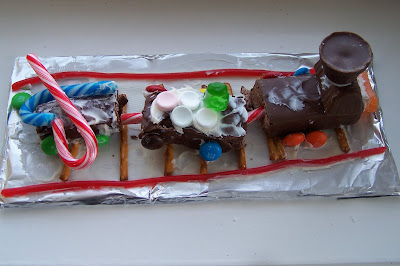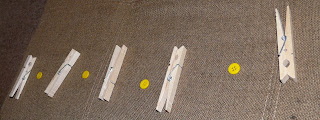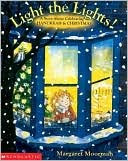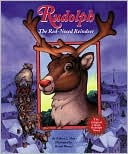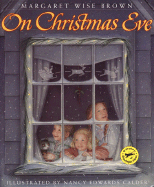This week we are learning about reindeer. I decided to take it a step further and go ahead and make the
Val posted about, and make it a reindeer themed week. Here's what we are doing:
1. Hands and Feet Reindeer: This is great as a keepsake for little hand prints. :) You'll need brown and black paper, plus 2 small white circles (for eyes, or you can use big wiggly eyes), one black circle for the nose, red glitter (optional), glue, scissors, pencil for tracing.
Trace their foot (or feet if you are making more than one) on brown paper. Trace hands on black or tan paper. These are for the antlers, so make them whatever color you want them to be. You need 2 hands and one foot per reindeer. Let them glue the hands on top. Since my daughter is still not a fan of glue on her hands, we use cotton swabs to let her put the glue on her papers. Glue eyes and nose on. Cover the nose with glue and let them sprinkle red glitter on the nose if they want to make Rudolph.


2. Reindeer Cookies: You need sugar cookie dough (store bought is fine), pretzels, chocolate chips, and M&Ms. Before you start, break the pretzels up to look like antlers.
For the kids to do: Roll the sugar cookies into balls. Stick 2 pretzel on for antlers.
For you to do: Bake according to sugar cookie directions. While they are still hot stick on the M&M and chocolate chips. Learn from my mistake. :) If you bake them on wax paper, you can slide them off the cookie sheet so your child can stick them on without fear of burning themselves on the pan.
3.
Reindeer Breakfast: Williams
Sonoma has these GREAT
pancake molds. Super easy, easy to clean, and they have a snowman, too. That way it can be used past Christmas. Served pancakes with a side of pretzel sticks and dried berries (sticks and berries). I invested in these because they are very nicely made and will last a long time. I think we'll get lots of use out of these.
4. The letter R. We've been using letter stamps and stamping papers. Holding the stamps, pressing on the ink pad, and pressing hard enough to make the letter on the paper are great for hand strength. Also, if you put lines on a paper and have them stamp on the line, you can work on hand-eye coordination as well.
We have cookie cutters in the shape of letters to cut out cheese, lunch meat, bread, etc.
5. Shape of the week:
If it's triangles, make open-faced reindeer sandwiches. Cut a slice of bread in half diagonally. You'll have 2 triangles. I let my toddler use a plastic knife or spreader to smear on peanut butter. Add some pretzels for the antlers. Cut a banana up in coins. If you cut one of the coins in half, you can use those for eyes. Chocolate chips, shredded cheese rolled into a ball, or brown M&Ms work. For the nose you can use raisins, craisins, or M&Ms.
Draw a reindeer out of basic shapes on a piece of paper. (Triangle=head, circles for eyes and nose, long rectangles for antlers). Use the
Do-A-Dot markers to color. Helpful if the shape of the week is a circle, too.
Try shape pictures. You can also cut out shapes and let your child try to make a reindeer out of the shapes.
6. Puzzles: This is a do-it-yourself puzzle. Find a picture of a
reindeer and print 2 copies. Depending on the skill level of your child, cut one picture into
pieces. Show them the original and let them try to put the puzzle together. When just staring out or for young children, start by cutting the picture in half or fourths.
7. Make a touch-and-feel reindeer book. Sounds complicated, but it really isn't. Some reindeer facts you need to know first.
- Reindeer have antlers that are covered with velvet when growing. The velvet falls off once the antlers get to the correct size. The antlers help them hear! *Cut out antlers using felt, velvet, or cloth and glue them on a page.
- Reindeer like it cold! Using paper or a coffee filter, cut out a snowflake and glue it on another page. If you don't know how to make a snowflake, try this website for directions.
- They can swim easily. Take a picture of a reindeer and glue down crumpled blue tissue paper (like it's swimming).
- The hooves can change depending on the season. In the summer, they are soft and spongy and in the winter they are hard. Cut a hoof out of a sponge and piece of cardboard (like from a box).
- They like to eat moss, but will eat leaves and grass. Take a walk outside and get some reindeer food to glue in your book.
8. Reindeer Song: (Sounds like 5 Little Monkeys Jumping on the Bed)
Eight little reindeer pulling Santa's sled
One fell down and bumped his head.
The elves called Santa and Santa said,"Can seven little reindeer pull my sled?"
(Go from 8 to 1, repeating the above lines)
One little reindeer pulling Santa's sled,
He fell down and bumped his head.
The elves called Santa and Santa said,"Call Rudolph!"
(Works on rhyme, and counting backwards from 10 to 1, and finger recognition of numbers)
9. Reindeer food: Mix oats and glitter or oats and green and red sugar/sprinkles. Sprinkle outside for the reindeer Christmas eve. We've added raisins, too.
10. Reindeer bird feeders: a new spin on the traditional peanut butter bird feeders. Cover a
pine cone with peanut butter. Place pretzels for antlers and raisins for eyes and nose FIRST. I used dried cherries for the nose and prunes for the eyes. Depends on the size of your
pine cone. Then roll in bird seed. (I saved an old coffee can and put the
pine cone inside with birdseed and let my toddler shake it. Less mess!)
11. Footprints: Cut out 2 sponges like reindeer
footprints. Get the sponges wet and tape them to your child's shoes (or tie them). The tape doesn't slip if you wrap the masking tape all the way around the shoe. Put a huge
piece of paper on the floor. I used brown (like dirt/mud). The sponge will make footprints on the paper as they walk. I put a
string down and had Charis try to walk in a straight line. We also pretended to dig for food like reindeer do. The prints dry quickly, leaving a clean
piece of paper to draw (or stomp) on. Since it's just water, there wasn't much to clean up!
Have fun!








